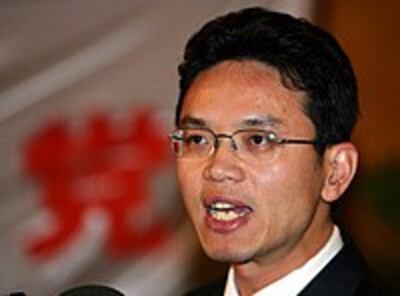
WASHINGTON—A Chinese diplomat seeking asylum in Australia says he had orders to confiscate the passports of Chinese-born Falun Gong practitioners in the country and deny them extensions on Chinese passports that were set to expire.
Chen Yonglin also said he managed to remove “most” names from a blacklist of 800 Chinese Falun Gong practitioners in Australia during his four years as Chinese consul for political affairs in Sydney.
He left his post and sought political asylum in Australia on May 26. His asylum application was rejected, and he was advised to apply for a protection visa, which is now under consideration.
In an interview with RFA’s Mandarin service, Chen said he became “very afraid” of the potential consequences if Chinese authorities learned of his efforts to help the Falun Gong, a grassroots group that Beijing has outlawed as an “evil cult.”
“I managed to do a few things to help the Falun Gong. For example, to get passports extended for some of them and to get some names taken off the list,” Chen told RFA reporter Shi Shan in a telephone interview.
According to my understanding, there are a lot of spies among the Chinese community here...
“When I got there, there were around 800 names on the Falun Gong blacklist, and I managed to get rid of most of them. If my successor should check out my work, [he or she] would realize there were big problems with the way I was carrying out government policy on the Falun Gong.”
“There was no room for this sort of religion back home in China,” he said, adding that Beijing has asked Australian police guarding the consulate “to do something about [Falun Gong] activities, which I thought was very wrong.”
“One of the other things they did to them, which I thought was inhumane and a contravention of their human rights, was to refuse to extend their passports if they were going to expire, and also to confiscate the passports of Falun Gong practitioners,” he said.
‘I sympathized with them’
“These are Chinese citizens, whatever you may think about them. They must have documentation in order to travel,” Chen said. “I had to keep my mouth shut and do as I was told. If I didn't do it, I'd be criticized.”
“I quite sympathized with the Falun Gong, who would arrange activities on various important dates...They would tell me to put pressure on the Australian government officials not to allow them to do this. But the Falun Gong in Australia is a legal organization which exists only to spread the teachings of Falun Gong.”
“If my successor should check out my work, he or she would have realized that there were big problems with the way I was carrying out government policy on the Falun Gong. So suddenly I began to be very afraid. I was also concerned about my conscience. I knew I would have to continue to work for this government, and I wouldn't be able to stand it,” he said.
‘Panicked’ in 1989
“Secondly, things could get much worse for me if they ever discovered what I'd done. At least in Australia I have the opportunity to become a Chinese person with a conscience, and to show that through my actions. I never had the opportunity to leave before now, so now that the opportunity is before me, I thought I should try to take it.”
I managed to do a few things to help the Falun Gong. For example, to get passports extended for some of them and to get some names taken off the [blacklist]...
Chen’s father was beaten to death on orders from a Communist Party official during the Cultural Revolution, he said, in retaliation for his writing a big-character poster for a group of villagers while he was a student at Qinghua University.
Later, during the 1989 pro-democracy movement in China, Chen said, he was obtaining work experience at the U.S. television network NBC in Beijing.
“I witnessed the bloodshed in person,” he said. “At the time I was coming to the end of my studies at China Foreign Affaire University, and I was doing my work experience, helping the NBC camera team as an interpreter."
“During that time, if I wasn't needed at work, I would go to Tiananmen Square and take part in the demonstrations. I also helped out some of the hunger strikers during their protest.”
On the night of June 3-4, 1989, he said, he joined a group of people holding hands and trying to stop Chinese troops from entering Tiananmen Square.
Chinese spies at work in Australia
“At the time I was very nervous and extremely scared. I thought my life was probably in danger. But I still went with everyone to obstruct their advance.”
Then the troops stopped, and Chen said, “I panicked. I jumped over a traffic barrier, cut through a small alleyway, and took cover in the hotel.”
Chen arrived in Australia in April 2001 and was assigned to monitor and report back on the activities of the pro-democracy movement, he said.
“According to my understanding, there are a lot of spies among the Chinese community here,” he said, adding that most are business people whose work takes them back to China. "They would tell the consulate everything. We could get information on someone as soon as we needed it."
“There are professional spies right in the consulate,” he said, adding that they “definitely” tapped dissidents' phones.
“Whenever there was an important event, such as a Chinese leader coming to visit, we would get information from the security body in China. Very detailed information on what, where, and when about activities being planned” in protest. “I was in charge of four main groups,” he said. “The Falun Gong, pro-democracy activists, Taiwan independence activists, and supporters of Uyghur and Tibetan independence.”
Original reporting for RFA's Mandarin service by Shi Shan. Service director: Jennifer Chou. Translated by Luisetta Mudie and produced in English by Sarah Jackson-Han.
